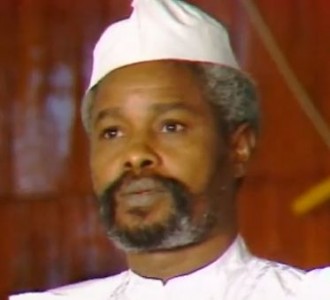A new hybrid court system, the Extraordinary African Chambers has just been set up, opening its doors on February 8, 2013, to judge Hissène Habré, ex-president of Chad in Senegal. The organisation Human Rights Watch has been working since 1999 with victims of the ex-dictator, currently exiled in Senegal, to bring him to justice.

Hissen Habré – still from a Euronews video, YouTube
[The french quotes in this article were directly replaced by their translation in english]
On website France-Rwanda Tribune we read of the Inauguration of the Special Tribunal [fr] charged with judging Hissène Habré:
Senegal initiated its Special Tribunal on Friday (february 8), charged with judging the former president of Chad, Hissène Habré.
An article on website fasozine.com entitled Senegal: Inauguration of Special Tribunal for the Trial of Hissène Habré gave more information:
Habré is accused of thousands of political assassinations and of systematic use of torture during his time in charge of Chad, from 1982 to 1990. Habré has lived in exile in Senegal for more than 22 years.
On website lanouvelleexpression.info, an article entitled An Important First: Africa Judges Africans [fr] included the following:
For the first time in Africa, a former African president is going to be judged in another African country, the African Union (AU) having being given the mandate to find African solutions to African problems. The Juristic advisor of the African Union (AU), Djenna Diarra, noted that “the Hissène Habré affair is important, not for Senegal, but for Africa. So that Africa judges Africans.
Concerning questions regarding impartiality and risks of pressure from Idriss Déby, who overthrew Habré in a 1990 coup to become current president of Chad, an article on website xalimasn.com included the following:
The prosecution, like the defence, are going to make use of complete freedom to conduct their investigations on Chad soil. It is an essential condition for the good conduct of the trial, and we will be paying particularly close attention to it.
The rights of the defence will be respected. The accused will have recourse to advice. They will lead their investigations freely. They will produce their own witnesses…
If we go back to the article on website lanouvelleexpression.info, it continues [fr]:
Regarding the quality and impartiality of the judges, Djenna Diarra’s opinion was just as clear: “We had taken into account a certain number of concerns which were that maybe the Senegalese courts would not be objective enough and we went towards this international element. …There will be judges from Central Africa, South Africa and elsewhere in future chambers.
We aren’t reinventing the wheel. We needed a system allowing plenty of objectivity and transparence. And we thought that the best way was the system put in place by Cambodia (to judge the former leaders of the Khmer Rouge). This method allows every guarantee of a trial in which the rights of the defence are guaranteed.
An article on website sunuker.com, entitled Hissène Habré Faces Justice, an Historic Moment for Africa, detailled the charge and the trial [fr]:
The 10 judges and four prosecutors who make up this court, named by the African Union, are now going to be able to start the long examination of the Habré file. On the other hand, Hissène Habré may not been seen in court before the end of 2014”, according to Reed Brody. “The trial is not going to be held for a while yet, but at least the process has been started, which was almost unimaginable”, continued the Juridic advisor of Human Rights Watch. … “I think that this show trial will make history for Chad and for Africa. It is going to show that humble victims can, by their action and their perseverance manage to judge a dictator.”
Following the many African dictators [fr] who have been judged in Europe by the International Criminal Court, it is definitely worth celebrating the fact that an African affair will, for once, be heard by an African court. The continent's credibility in the face of its other interlocutors will benefit greatly if the trial unfolds according to accepted standards of international law.







3 comments